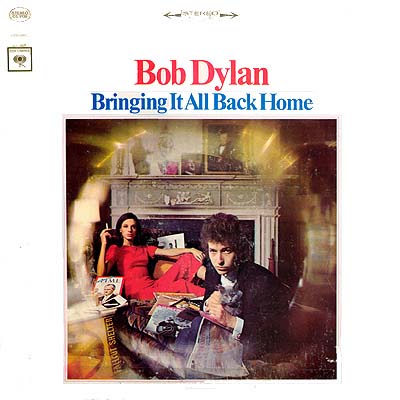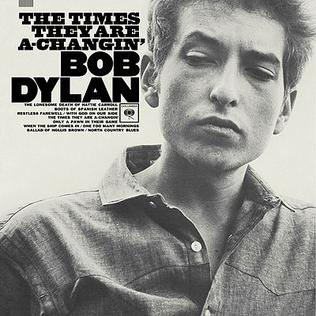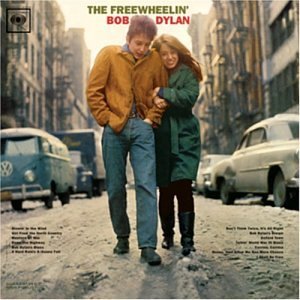An’ here I sit so patiently
Waiting to find out what price
You have to pay to get out of
Going through all these things twice
Waiting to find out what price
You have to pay to get out of
Going through all these things twice
1. Rainy Day Women #12 and 35 (4:36)
2. Pledging My Time (3:50)
3. Visions of Johanna (7:33)
4. One of Us Must Know (Sooner or Later) (4:54)
5. I Want You (3:07)
6. Stuck Inside of Mobile with the Memphis Blues Again (7:05)
7. Leopard-Skin Pillbox Hat (3:58)
8. Just Like A Woman (4:50)
9. Most Likely You Go Your Way (And I'll Go Mine) (3:30)
10. Temporary Like Achilles (5:02)
11. Absolutely Sweet Marie (4:57)
12. 4th Time Around (4:35)
13. Obviously 5 Believers (3:35)
14. Sad Eyed Lady of the Lowlands (11:20)
Review: Following the double-barrel shot of electricity that was Bringing it All Back Home and Highway 61 Revisited, Bob embarked on a world tour, bringing him famously to England as documented in Don't Look Back and Live 1966: The Royal Albert Hall Concert. On this tour he played some then-unreleased songs that would find their way onto Blonde on Blonde.
Blonde on Blonde is simultaneously completely unexpected and exactly what one would expect Bob to do after Highway 61 Revisited.
The album opens with the salvation army band sound of 'Rainy Day Women.' This sounds unlike anything Bob has done before or since - band members playing instruments they are not versed in, overt drug references in every lyric.
Bob follows that up with a straight blues number, 'Pledging My Time,' which could have fit on Highway 61 Revisited, but hear it is filled with Bob's weary, 4-A.M. up-all-night voice drawling through such lyrics as "Won't you come with me babe, I'll take you where you wanna go, and if it don't work out, you'll be the first to know."
Next comes the first, and best, of many standout numbers on the album: 'Visions of Johanna.' One of Bob's best songs ever, and a song I look forward to every time I put the album on. Listed at 7 and a half minutes long, the song breezes by and is over before you know it. Yet there is an eternal quality about it, as if as the songs fades out, the listener knows the Visions will continue on and on endlessly. Robbie Robertson's guitar interweaves seamlessly with Bob's verses as if they were part of one entity. Pure magic.
'One of Us Must Know' is a nice tune that has been overshadowed by the behemoths of the album. The verses seem to drag aimlessly, whereas the chorus, punctuated by machine-gun drum fills, is direct.
'I Want You' is a charming 3 minutes that gives way to the paranoia and alienation of 'Stuck Inside of Mobile with the Memphis Blues Again.' 'I Want You' is one of the catchier and more lovely songs Bob had written at this tremendously productive time in his career. 'Stuck Inside of Mobile' as noted is a wonderfully surreal account of things happening all around the narrator that he has little control over. It's another highlight on this great album. Bob would go on to play some roaring live versions of the song in 1988, aided by the energy of guitarist G.E. Smith and a great garage band.
'Just Like A Woman' is probably the most notable of Bob's patented 'anti-love songs.' Although the verses can be sweet at time, he sneers at the object of his disdain during the chorus.
Side 2 opens with 'Most Likely You Go Your Way And I'll Go Mine,' a manic cut that was even faster and more manic during Bob's 1974 tour with The Band. One starts to notice that there is harmonica on every track. It often is a pleasant accompaniment, but it can be a bit grating at times, like on the next cut, the sluggish 'Temporary Like Achilles,' and the follow up, 'Absolutely Sweet Marie.'
'4th Time Around' opens with harp as well, but here it is a welcome addition to the guitar arpeggios. This song is famously a spoof/response to the Beatles' 'Norweigian Wood.' As the story goes, Lennon recorded the Bob-sound-a-like 'You've Got To Hide Your Love Away,' and this track was a wink back from Bob to the boys from Liverpool. The closing harp solo is quite nice as well.
If there is such thing as a "throwaway track" by Bob during this period, 'Obviously 5 Believers' would be chief among them. Its a blues that just isn't very memorable in tune, lyrics, or instrumentals.
The album closer is the majestic 'Sad Eyed Lady of the Lowlands.' Clocking in at over 11 minutes on an album that had already gone 61 minutes before this song, I dare say it overstays its welcome. Still, it has a welcome harp break towards the end.
Overall, this album is often considered Bob's best, or in his top 2 along with Blood on the Tracks. It is a great album, but I think it has too much filler to quite match the heights of Blood. I place it just slightly below Bringing it All Back Home and Highway 61 Revisited. Still, any album with tracks like the magical 'Visions,' 'Stuck Inside of Mobile,' and other excellent songs like 'I Want You' and 'Just Like A Woman' is necessary rock and roll listening.
Rating: 9/10 *********/**********
Best 3 song run: Visions of Johanna / One of Us Must Know / I Want You
Song I'm most likely to skip: Obviously 5 Believers, obviously.
Song Tiers: A+: Visions of Johanna
A: Stuck Inside of Mobile with the Memphis Blues Again, I Want You
A-: One of Us Must Know, Just Like A Woman
B+: Rainy Day Women #12 and 35, 4th Time Around
B: Absolutely Sweet Marie, Most Like You Go Your Way, Leopard-Skin Pillbox Hat, Pledging My Time
B-: Sad Eyed Lady of the Lowlands
C: Temporary Like Achilles, Obviously 5 Believers
Steven Sroczynski is an author and attorney from Massachusetts. He can be reached at steve.sroczynski@gmail.com
Copyright 2015 by Steven Sroczynski. All rights reserved. This blog, or any portion of it, may not be reproduced without the express written consent of its author, Steven Sroczynski.






